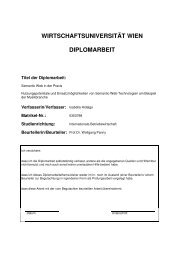Wirtschaftsuniversität Wien Magisterarbeit - SemanticLab
Wirtschaftsuniversität Wien Magisterarbeit - SemanticLab
Wirtschaftsuniversität Wien Magisterarbeit - SemanticLab
You also want an ePaper? Increase the reach of your titles
YUMPU automatically turns print PDFs into web optimized ePapers that Google loves.
1. Introduction<br />
This thesis addresses the users’ need for privacy on the World Wide Web (WWW),<br />
common threats to privacy and which solutions exist to encounter these threats on the<br />
Internet 1 .<br />
Every Internet-application such as an e-commerce shop, an online banking application<br />
or a search-engine needs certain data to function and it collects this data from its users.<br />
This collected data is protected by laws and regulations. However, these laws do not<br />
necessarily protect the data as strictly as users would expect. If users have a lack of<br />
understanding of how their data can be (mis-)used once it has been collected, then this<br />
leads to a precarious situation considering the false prospects of data protection laws.<br />
1.1. Objective<br />
The issue of web browsing privacy and privacy threats is especially important as more<br />
and more services are delivered online: Internet banking, medical advice, e-mail, tax<br />
return, e-learning, shopping and much more [Ant07]. All these services need certain user<br />
information to operate. A web shop for example needs an e-mail address to send status<br />
e-mails to the customer. It needs credit card information or bank account information to<br />
withdraw the money. And it has to know the real name and address of a user to deliver<br />
the products purchased. For the convenience of the customer, all this data can be stored<br />
on one of the vendors’ servers - if the customer has provided this information once, he<br />
or she does not have to provide it during the checkout for the following purchases. From<br />
a customer perspective, that definitely is convenient. On the other hand, does the user<br />
still have control over his data? Can he or she be absolutely certain, that no one is going<br />
to mis-use the data provided?<br />
Certainly, there are regulations and laws which, in most countries, prohibit acts such as<br />
mis-use of personal data (e.g. “The Federal Act Concerning the Protection of Personal<br />
Data” - DSG 2000 - in Austria or the “Data protection directive” 95/46/EC of the<br />
European Union). At least the owner of the data has to agree if his or her data is being<br />
used for other purposes. Privacy policies, for example, can be found at every commercial<br />
website or portal. However, the question is how many web users are actually able to<br />
find such policies. And if they have been found, if they are read and also understood.<br />
Another issue arises when it comes to the lack of understanding how information and<br />
data provided during web browsing can easily be found on the web. If one takes a closer<br />
look at social networks such as Facebook or MySpace - do users really know that all their<br />
2<br />
1 Although technically not correct, the terms “WWW” and “Internet” are going to be used interchangeable<br />
in this thesis for the readers’ benefit





